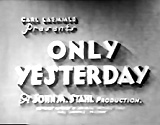
|
Only Yesterday (1933)
In director John M. Stahl's pre-Code romantic, soapish
tearjerker melodrama - a saga about an unwed mother - most clearly
an adaptation of Stefan Zwieg's 1922 novella Letter from an Unknown
Woman - remade with the title Letter
From an Unknown Woman (1948) a decade and a half later by
Universal Pictures and director Max Ophuls:
- the opening montage of the disastrous effects of
the Great Depression as a result of the October 29, 1929 Stock
Market Crash, including a dejected-looking man having a shoeshine
- and then shooting himself in the head (off-screen) inside a "Gentlemen"'s
room (a gunshot was heard from outside the door)
- the scene of financially ruined, unhappily-married
Wall Street banker James "Jim" Stanton Emerson (John Boles)
- to unfaithful socialite Phyllis Emerson (Benita Hume) - was about
to suicidally shoot himself at his office desk in his locked Park
Avenue study; he opened a deathbed letter from an unknown, dying
woman from his past (that he couldn't remember!) whose paths had
crossed over the years without her revealing her identity; it began: "My
dear, Does the name Mary Lane mean anything to you? And have you
forgotten completely a night in Virginia during the war? To me, it
seems only yesterday..."
- their story was told in flashback, beginning with
twelve years earlier in 1917 - a one-night stand in a moonlit garden
setting during an officers' ball-dance in Virginia between Lt. Emerson
and 19 year-old southern belle Mary Lane (Margaret Sullavan in her
film debut); he told her before kissing her: "I think I'm going
to be in love with you in just a minute now" - and after they
disappeared into the greenery, they later returned with Mary's dress
sash untied (after sex) and found to their surprise that the dance
had ended long ago -- it was on the eve of his departure to serve
in the Great War in 1917; in an embrace, she reminded him as she
gave him a sad goodbye: "Good night, my love. And when we walk
down that lane, I want you to remember that I've loved you for two
years, not just tonight"
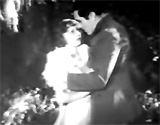
|
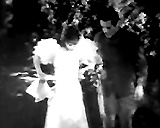
|
|
Jim's One-Night Stand with Mary in Moonlit Garden
in 1917
|
- the depiction of Mary's struggling ordeal as an
unwed single mother and raising her son Jimmy, Jr. (Jimmy Butler)
on her own - born on Armistice Day (November 11, 1918), while she
roomed in NYC with her Aunt Julia Warren (Billie Burke), manager
of a beauty shop
- the scene of Emerson's return from the war in New
York during a welcome ticker-tape parade down Fifth Avenue, when
he didn't recognize Mary after she greeted him: "Hello, Jim...It's
so wonderful to see you again"; instead - without realizing
her identity, he turned and embraced female acquaintance Helen (Mabel
Marden) and then his socialite fiancee Phyllis - and there was a
long close-up and shock of disappointment and hurt that registered
on Mary's face, who later recalled to her Aunt Julia Warren: "Yes,
I saw him...and he didn't know me...he spoke to me, he shook hands
with me, and he didn't know who I was"; she was stunned that
after their one momentous night of love-making ("One evening!
It was a lifetime for me"), he couldn't remember her
- the additional seduction scene about a decade later
when Mary (who was being pursued by suitor-fiancee Dave Reynolds
(George Meeker)) happened to spot Jim during a New Year's Eve party
at the St. Regis Hotel; he immediately invited her to leave the party:
"We can't talk here, can we go?", and she agreed to accompany
him to his "bachelor" apartment; on the way, he asked: "Haven't
we met before?"
and obviously didn't remember her --- but tried to compliment her:
("When I saw you tonight across the room, for just a moment, I
did think I knew you...That isn't possible isn't it?...But I couldn't
have forgotten anyone so lovely as you are!...I don't have to tell
you how very attractive you are!...You're pretty, lovely"); she
called him by his name, claiming that he was a well-known public figure
- at midnight, they had a drink to toast the New Year
(Mary: "Here's luck!"), but she remained evasive and "mysterious,"
and didn't reveal her own past relationship or identity with him: ("Does
that make it better, knowing?... the ideal way -- no questions asked,
no questions answered"); when he told her: "You are marvelous....I
like you enormously. Does it worry you being here?...You're not afraid
here?...You like me? (they kissed) You know, this is the most delightful
New Years I've ever spent...But I want more than just this moment.
I'm already thinking when I can see you again. Would, uh, tomorrow
be too soon?"; she challenged him about his claim of their having
a "happy ending":
"I'll bet that in six months, in one month, you'll have forgotten
we ever met"; he disagreed: "Don't be silly," then kissed
her again before the scene faded to black (they made love - off-screen)
- six hours later, the morning dawned and she still
hadn't told him her name or romantic availability; when he requested
seeing her again, she answered: "Not ever. Let's leave it at
this. Just a moment together and gone. I've had two moments like
this in my life...Oh no, this must be the end. Otherwise, there would
be complications. It's so much better to leave it at this - perfect.
Goodbye, and thank you for a Happy New Year"
- the scene of Mary's lingering death from a chronic
heart ailment after she penned the final words of the letter to Jim
of her life's story on October 29, 1929 (to be mailed by Julia following
her death), and was calling out to her son Jimmy, Jr: ("Jimmy!
Hurry darling! Julia, why doesn't he come?...I mustn't go yet. I
must wait for him...Doctor, Doctor, I'm getting weaker, I don't want
him to see me like this. Can't you do something?")
- her final moments with 11 year-old Jimmy dressed in
his military uniform: ("I've got to go away for quite a long
time, and I want you to promise to be as good a boy when you're big
as you have been to mother when you were little. Darling, don't cry"),
before she died (off-screen)
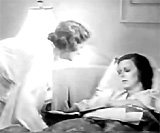
|
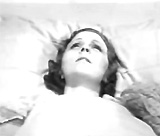
|
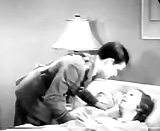
|
|
Mary Writing The Final Words of Letter to Jim
|
Lingering Death: Calling Out to Son
|
With Son Before Death
|
- the scene of Jim reading the end of the letter
that revealed he had fathered a son by her: ("...and now goodnight,
my dear. I should have never told you all this except for your
son -- go and see him -- I know you will love him. God bless and
keep you both. Yours, Mary Lane"); with a solid reason to
live, he replaced his gun in a drawer, and had a confessional talk
with his wife Phyllis about how their marriage was essentially
over: ("I'm not walking out on anything because there's nothing
here to walk out on. There's nothing between us. We've both known
that for a long time. Today when I saw the world go to pieces,
I realized how empty my life had been, and then I found this letter
here. A letter out of the past. It has given me something to live
for. And I'd hope, Phyllis, that you might have found someone who
would make you happy, too. But that's all in the future to be talked
over. The great thing is, Phyllis, that there is a future")
- the final sequence of Jim arriving at Mary's apartment,
his first glance at Jimmy, Jr. ("I've come to see your mother")
- and discovering that she had already passed away: (Jimmy: "My
mother died"); he comforted the weeping boy in his arms: ("Next
to you, I'm the sorriest person in the world"); after becoming
better acquainted and learning about the boy's medals on his uniform,
he then confessed that he was Jimmy's father - and the boy's tremulous
response: "My father?" - as the film abruptly ended
|
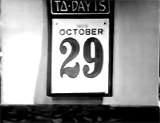
Stock Market Crash
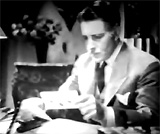
Suicidal Wall Street Banker "Jim" Emerson Reading
Deathbed Letter From Mary Lane
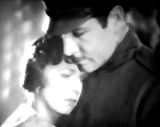
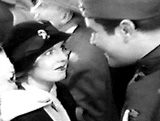
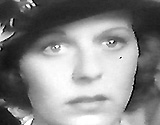
Welcome Home Parade: Hurt on Mary's Face For Not Being
Recognized
Seduction Scene About a Decade Later:
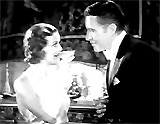
Mary's New Year's Toast: "Here's luck"
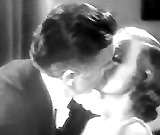
Kiss Before Fade-Out to Black
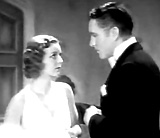
Mary: "Leave it at this - perfect"
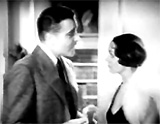
Jim's Confessional Talk with Wife Phyllis
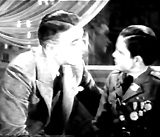
Jim with Son Jimmy, Jr. ("My father?")
|











